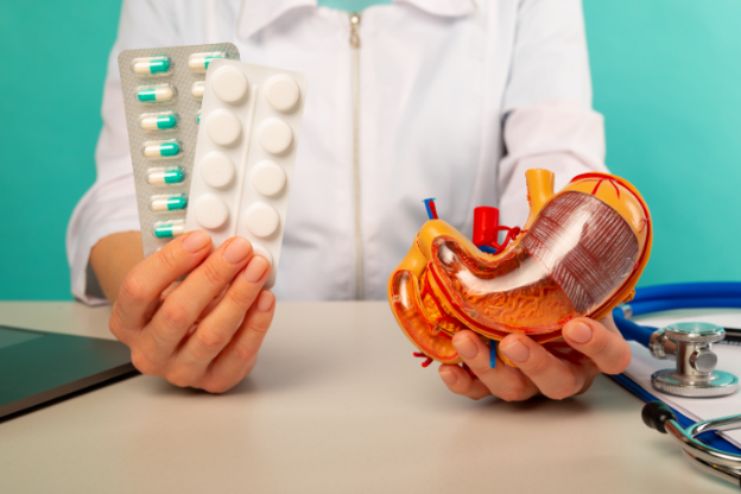Affiliate Disclaimer
Some links in this article are affiliate links. We may earn a small commission if you make a purchase through these links, at no extra cost to you. We only recommend products we find useful to our readersImagine constantly facing issues such as bloating, abdominal pain, or unpredictable bowel habits without knowing the root cause. For many, these symptoms are daily struggles, often leading to confusion between two common but different conditions: Small Intestinal Bacterial Overgrowth (SIBO) and Irritable Bowel Syndrome (IBS). You must understand the difference between the two to take the first step toward reclaiming your digestive health.
Read More: How Digestive Health Impacts Glucose Absorption and Diabetes
We all experience digestive discomfort at some point, and understanding the difference between SIBO and IBS is crucial to managing it effectively. These two conditions are often confused but have distinct causes, symptoms, and treatment options. While both can have a major impact on quality of life, understanding their differences can help us intervene accordingly.
In this article, we will understand various factors that make SIBO and IBS unique, explore common symptoms, and discuss actionable plans for diagnosis and management. We will help you, irrespective of whether you want to understand an SIBO diet plan, IBS-related health tips, and ways to manage IBS symptoms.
Read More: 10 Mistakes to Avoid When Trying to Improve Your Gut Health
What Is SIBO?

SIBO, or Small Intestinal Bacterial Overgrowth, occurs when an excessive number of bacteria populate the small intestine. This disturbs digestion and nutrient absorption. Unlike the large intestine, the small intestine is not designed to host a large bacterial growth and struggles when there is an overgrowth.
Symptoms:
- You have issues such as constant bloating and excessive gas.
- Abdominal discomfort or pain that doesn’t go away on its own.
- Other digestive issues such as chronic diarrhea, constipation, or both.
- Sudden and unexplained weight loss due to malnutrition.
Causes:
Slow gut motility often allows bacteria to multiply rapidly. This overgrowth leads to SIBO.
Common causes of SIBO include:
- Surgery: Abdominal surgeries, including gastric bypass or gastrectomy, tend to create pouches or blockages in the small intestine. These gaps promote bacterial overgrowth.
- Structural Issues: Certain structural issues of the small intestines, such as scar tissue, adhesions, or pouches, can cause food to accumulate. This creates a favorable environment for bacteria to thrive and multiply.
- Underlying Diseases: Conditions like Crohn’s disease, celiac disease, diabetes, and scleroderma can slow the movement of food and waste through the small intestine, increasing the risk of SIBO.
- Immunodeficiency: A weak immune system caused by disorders such as AIDS or immunoglobulin deficiency can lose the ability to regulate gut bacteria.
- Psychological Stress: Stress can disrupt the intestinal barrier and contribute to an imbalance in gut bacteria.
- Peristalsis Dysfunction: Peristalsis is the wave-like muscle contractions that move food through the digestive system. When these slow down, bacterial multiplication can occur.
- Medications: Proton pump inhibitors and other medications that reduce stomach acid can weaken the gut’s natural defense mechanisms, encouraging bacterial overgrowth.
- Diagnosis: SIBO is typically diagnosed through breath tests like lactulose or glucose tests. These tests measure hydrogen or methane gas bacteria produce in the small intestine. They are noninvasive and help us gain insights into bacterial activity.
Read More: Why Prebiotics Might Not Work Without Probiotics
What Is IBS?

Irritable Bowel Syndrome (IBS) is a functional gastrointestinal disorder caused by chronic digestive issues. Unlike SIBO, IBS does not have any structural abnormalities. It results from a lack of coordination between the brain and the gut.
Symptoms:
- Constant and recurring abdominal pain or discomfort that is often relieved after bowel movements.
- Altered bowel habits: diarrhea (IBS-D), constipation (IBS-C), or mixed patterns (IBS-M).
- Excessive gas and bloating.
- Sensitivity to certain foods, leading to flare-ups.
Causes of IBS:
The exact cause of IBS remains unclear, but contributing factors include:
- Gut Microbiome Changes: Any changes in gut bacteria, fungi, and viruses might worsen IBS. Research shows individuals with IBS may have a different microbial balance than those without IBS. This is gut dysbiosis.
- Muscle Contractions In The Intestine: The intestine has walls lined with muscle layers that contract to help food move through the digestive tract. Stronger and continuous contractions may lead to bloating, gas, or diarrhea, while weaker contractions slow down the movement of food and result in hard, dry, and constipated stools.
- Nervous System Dysfunction: If certain nerves in the digestive system are damaged, it may cause abdominal discomfort. Lack of coordination between the brain and intestines can increase sensitivity and cause pain, diarrhea, or constipation.
- Severe Infections: Bacteria and viruses causing diarrhea and infections might be a starting point of IBS. Gastroenteritis leads to bacterial overgrowth and an imbalance between the harmful and good gut bacteria.
- Early-Life Stress: Stress has been reported as one of the culprits worsening the condition of IBS. Stress stimulates the gut-brain axis, causing symptom flare-ups in IBS. We must understand that IBS is a stress-sensitive disorder, and managing stress and related responses is crucial in its management.
Diagnosis:
IBS is diagnosed based on symptom patterns and by excluding other conditions. Healthcare providers often use the Rome IV criteria, which focus on recurrent abdominal pain and changes in stool frequency or form.
Key Differences Between SIBO and IBS

As mentioned earlier, though SIBO and IBS have specific common symptoms, they are distinct in various ways. Here are a few overlapping symptoms and particular factors that make them similar yet different.
Origin:
- SIBO: Results from bacterial overgrowth in the small intestine, leading to food fermentation, gas production, and digestive disruption. This condition typically arises due to motility issues, anatomical abnormalities, or underlying illnesses.
- IBS: A functional gastrointestinal disorder with no structural or bacterial origin. It is often linked to dysregulation of the gut-brain axis, where the nervous system improperly controls digestion.
Symptom Overlap:
Both SIBO and IBS share symptoms such as bloating, excessive gas, abdominal discomfort, and irregular bowel movements, which can make it difficult to differentiate. However, the root cause differs: SIBO’s symptoms often occur due to bacterial activity disrupting digestion, while IBS symptoms result from a dysfunction between the gut and the brain.
Symptom Differences:
- SIBO: Symptoms may include nutrient malabsorption, leading to unexplained and sudden weight loss, fatigue, and vitamin deficiencies due to poor absorption. These symptoms are not so common in IBS.
- IBS: Emotional triggers such as stress or anxiety often worsen IBS symptoms. A few significant symptoms include abdominal pain that gets better after a bowel movement.
Diagnosis:
- SIBO: SIBO can be diagnosed using breath tests, such as the lactulose or glucose breath test. These help detect hydrogen or methane gases produced by bacteria in the small intestine. Additional tests may also help assess nutrient deficiencies or underlying conditions.
- IBS: IBS is diagnosed using criteria other than clinical symptoms, such as the Rome IV standards, which focus on recurrent abdominal pain and bowel habit changes.
Treatment Approach:
- SIBO: In SIBO, the primary focus is on removing bacterial overgrowth. Treatments may include antibiotics like rifaximin and herbal antimicrobials. Certain dietary changes, such as a low-FODMAP or elemental diet, are also beneficial. Follow-up often involves addressing underlying concerns to prevent them from recurring.
- IBS: Managing IBS requires a tailored approach to reduce the symptoms. This may include dietary changes like a low-FODMAP diet, stress-reduction techniques like cognitive-behavioral therapy, and symptom-specific medications like antispasmodics or laxatives.
Can SIBO and IBS Coexist?
According to research, there is a significant overlap between Small Intestinal Bacterial Overgrowth (SIBO) and Irritable Bowel Syndrome (IBS). Studies indicate that SIBO could potentially be a contributing factor to IBS in as many as 40% of cases, meaning a substantial portion of people diagnosed with IBS may also have SIBO present. For example, individuals diagnosed with IBS who undergo treatment for SIBO, such as antibiotics, frequently report significant symptom relief. Understanding this connection can help guide more comprehensive and personalized treatment plans.
Read More: 9 Ways to Fix Your Leaky Gut: Fix Part of Your Digestive System.
Treatment Options for SIBO and IBS

As SIBO and IBS vary due to their root causes, the treatment options also differ. Here is how we can treat them.
For SIBO:
- Antibiotics: Treatment for SIBO includes medications, including rifaximin, that target bacterial overgrowth.
- Dietary Changes: Changing your diet according to the symptoms of SIBO, such as a low-FODMAP or an elemental diet, can be beneficial. This helps reduce fermentable carbohydrates that promote bacterial growth.
- Probiotics: Specific strains of probiotics can help restore gut balance and reduce related symptoms.
For IBS:
- Dietary Changes: A low-FODMAP diet is often recommended for people suffering from IBS to minimize symptom triggers.
- Stress Management: Stress management and relief techniques like mindfulness, yoga, or cognitive-behavioral therapy can benefit individuals suffering from IBS.
- Medications: IBS can be painful, and certain medications, such as antispasmodics, can give some relief. There are fiber supplements available for constipation and anti-diarrheal medications for IBS-D.
When to See a Doctor?
However, not all but a few symptoms need medical attention and care. These include:
- Severe and persistent abdominal pain.
- Noticing signs of malnutrition, such as unexplained weight loss.
- Having blood in stool or other unusual changes in bowel habits.
Consulting a healthcare provider ensures timely diagnosis and accurate treatment.
Lifestyle Tips for Managing Digestive Health

A few lifestyle tips can help effectively manage IBS and SIBO. Besides medications, changing lifestyle habits can be beneficial to keep your gut healthy.
- Stress Management: Chronic stress can worsen digestive issues. Engage in relaxation techniques like deep breathing or meditation.
- Balanced Diet: Include whole, unprocessed foods and avoid foods that cause known triggers.
- Regular Exercise: Research has shown that regular physical activity supports gut motility and benefits overall health.
- Stay Hydrated: Ensure proper and adequate water intake throughout the day. This aids digestion and prevents dehydration and loss of essential nutrients.
Conclusion
You might be confused if you have issues related to IBS or SIBO. This is because IBS and SIBO might seem similar in so many ways yet are distinct in various other aspects. SIBO and IBS are primarily different due to their symptoms and underlying causes. This differentiator helps in addressing the issue correctly and prompt treatment. Identifying whether your symptoms stem from SIBO, IBS, or a combination of both is crucial to knowing the next steps.
Specific digestive issues including Irregular bowel movements, certain food triggers, abdominal discomfort, diarrhea, or any other gut-related concerns, must be addressed immediately. Ensure you do not ignore these signs; if they are severe, consult a healthcare provider. They will guide you in proper diagnosis and further treatment, whether SIBO or IBS. We must address the root cause and adopt effective strategies, including lifestyle and dietary changes, to regain control over gut health.
References
- https://primehealthdenver.com/ibs-diet/
- https://www.niddk.nih.gov/health-information/digestive-diseases/irritable-bowel-syndrome
- https://pmc.ncbi.nlm.nih.gov/articles/PMC8790555/
- https://drruscio.com/elemental-diet-for-sibo/
- https://pmc.ncbi.nlm.nih.gov/articles/PMC5347643/
- https://pmc.ncbi.nlm.nih.gov/articles/PMC10609453/
- https://pmc.ncbi.nlm.nih.gov/articles/PMC5357536/
In this Article

















